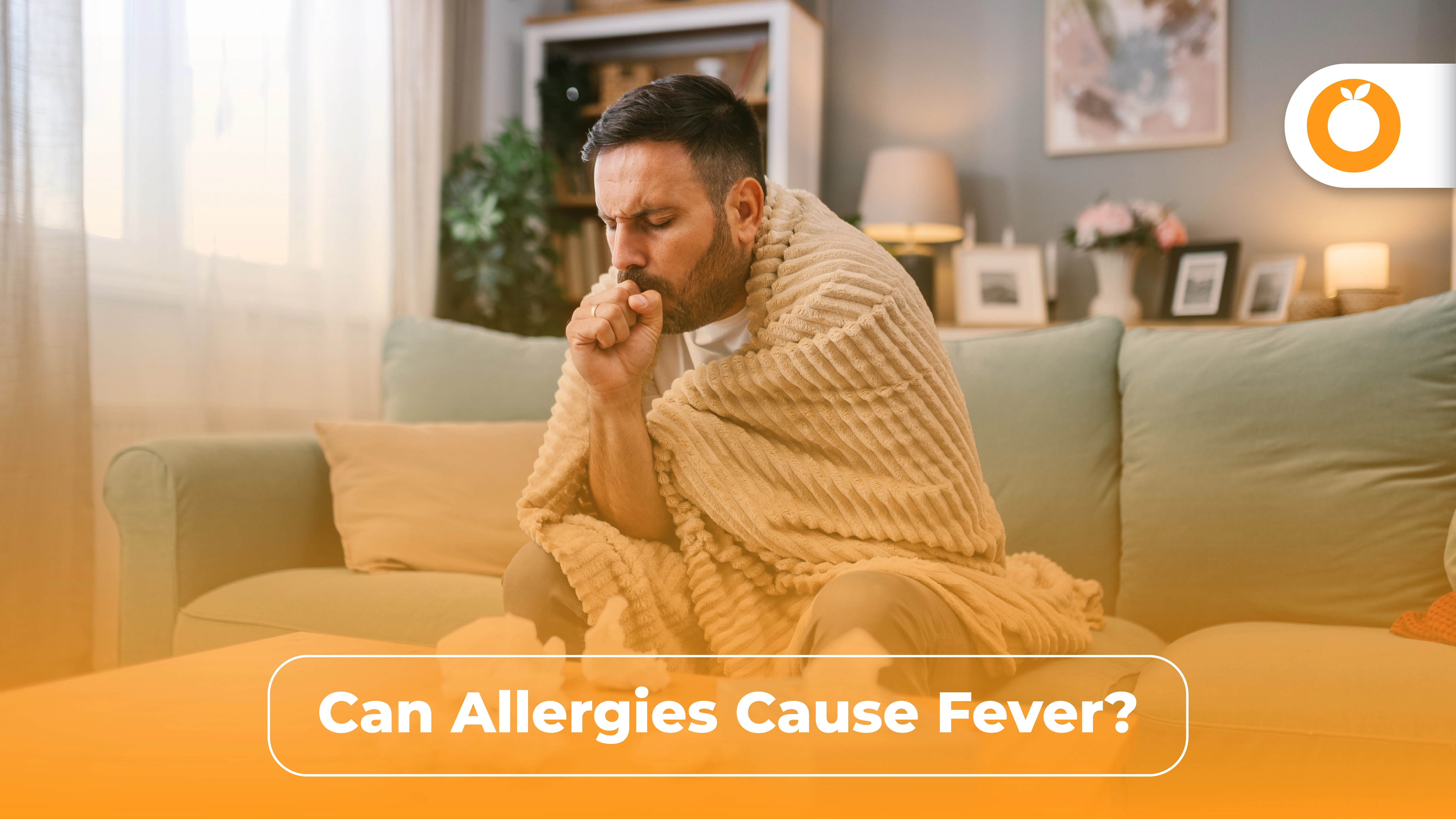Search for tests or checkups
SupportCan Allergies Cause Fever? What You Really Need to Know

Do Allergies Cause Fevers? The Answer Might Surprise You
Sneezing, itchy eyes, and a stuffy nose — sure, that sounds like allergies. But what if you're also feeling a bit feverish or drained? It’s something a lot of people wonder: Can allergies cause a fever, or is it a sign of something else?
In this article, we break down the difference between allergy symptoms and actual fever, explain why some allergic reactions might mimic fever-like sensations, and when it's time to seek proper testing—such as an allergy panel from Orange Health Labs—to get clarity.
Understanding the Core Difference: Allergies vs. Fever
Fever is your body's natural response to an infection (like a virus or bacteria). Allergies, on the other hand, are immune responses to non-harmful substances (like dust, pollen, or pet dander).
Key distinction: Allergies do not typically cause a rise in body temperature beyond the normal range. But they can make you feel drained, stuffy, or inflamed—mimicking the symptoms of being ill.
Why Allergies May Feel Like a Fever
Even though allergies don’t cause a true fever (i.e., body temperature above 100.4°F or 38°C), they can create fever-like symptoms, such as:
- Sinus pressure or facial pain
- Fatigue or sluggishness
- Mild body aches
- Chills due to congestion and mucus buildup
These symptoms are part of inflammatory responses, not an infection. They can make you feel "off", but you’d notice a normal reading.
Situations Where Allergies Might Be Misleading
Sometimes, an untreated allergy can lead to secondary issues like sinus infections (sinusitis). In those cases, fever may appear, but it's the infection, not the allergy, causing it.
Signs it may not be just allergies include:
- Persistent fever above 100.4°F
- Thick yellow or green nasal discharge
- Sore throat with white patches
- Shortness of breath or chest tightness
If you experience any of these, you should consult a doctor.
Allergy vs. Cold vs. Fever: How to Tell the Difference
Here’s a quick breakdown of common symptoms and what they might indicate:
- Sneezing: Common in both allergies and colds, sometimes seen in infections.
- Runny nose: Allergies often cause clear mucus; colds may produce clear or yellow mucus; infections typically involve yellow or green mucus.
- Itchy eyes: Very common with allergies, rare with infections.
- Fever: Rare in allergies, common with flu and infections.
- Body aches: Mild with allergies, often stronger with colds and infections.
- Sore throat: Can appear in all three but is more severe in infections.
- Onset: Allergy symptoms tend to appear suddenly, while infections build gradually.
When to Get Tested
If you're unsure whether your symptoms are allergy-related or something more serious, it helps to identify your specific triggers. This allows you to manage your environment and avoid unnecessary medications or complications.
Identify Your Allergy Triggers with Orange Health Labs
Orange Health Labs offers a comprehensive Allergy Test that checks for common allergens, including:
- Food Allergens: Peanut, Wheat, Soyabean, Cow Milk, Egg-White, Cod Fish, Shrimp, Blue Mussel
- Dust and Indoor Allergens: House dust (Greer), Cockroach, Papdi Chibil, Dermatophagoides Farinae, Dermatophagoides Pteronyssinus
- Pet Allergens: Dog Dander, Cat Dander
- Mold and Fungal Allergens: Alternaria Alternata, Aspergillus Fumigatus, Penicillium Notatum, Candida
- Pollen and Plant Allergens: Bermuda Grass, Common Ragweed (Congress Grass), Common Pigweed, Johnson Grass, Alder Wood, Birch Wood, Mesquite Pollen, Goose Foot Pollen, Mugwort)
Why Orange Health?
- At-home sample collection
- No fasting required
- Reports within 6 hours
Testing can help rule out infectious causes and give you a clear action plan for allergy management.
Book your comprehensive Allergy Test today and take control of your symptoms with clarity and confidence.

How to Protect Your Heart Before Problems Begin

Which Is Healthier for Your Heart? Ghee, Olive Oil, or Sunflower
